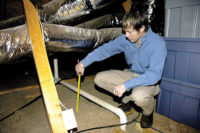Today, most manufacturers are emphasizing the need for “open” systems that use communication protocols such as BACnet®, LonWorks®, and ModBus. These manufacturers still support their older proprietary systems, but as a whole, they’re working to move their customers into the world of open protocol systems.
The reasons to move are many, say the manufacturers, including end users being able to buy from various sources and the ability to tie systems together so they perform seamlessly. Proponents also state that open systems are faster, more powerful, and more flexible than proprietary systems.
There are just as many supporters on the proprietary side of the debate, however. The proprietary side says that open systems are much more complex to design and install than proprietary systems. That complexity, they note, makes it almost impossible for an end user to make changes to a system without hiring a programmer. People in this camp argue that end users often prefer proprietary systems because they are less costly and easier to use and service.
And it is this last word that is the most important, yet least emphasized, word in the whole proprietary vs. open protocol debate: service.
Many controls contractors believe that it really doesn’t matter which type of protocol or system an end user wants. It’s the service provided by the controls contractor that should be the deciding factor when purchasing a BAS.
PROPRIETARY PREFERRED
One controls contractor who definitely prefers proprietary systems is Bart Bale, president and owner of Technical Energy Solutions, Byron Center, MI. “Proprietary systems are proven. They’re more simplistic to operate and maintain than an open system.“Customers have grown comfortable with their operation. Technicians have grown comfortable with their operation, and for the most part, they get the job done, and they get it done efficiently, without a higher level of complexity,” he said.
In fact, Bale can’t even think of an application that could benefit from an open system. He considers LonWorks and BACnet to be temporary protocols. “Pretty soon we’re going to have controllers that will talk the same language that the IT network talks. Then you’ll be able to access from the IT level with standard Internet browsers and standard Microsoft products directly to the controller level without any intermediate protocol.”
That being said, Bale believes it doesn’t necessarily matter what type of BAS is installed — it’s the customer service that really makes the difference. “In this industry, customer service is the most important thing you can offer to a customer, because as a controls contractor, you are their bus driver. You’re the one who knows how to operate a customer’s building the best. If you can’t put yourself in the customer’s shoes and work as a team player, you shouldn’t be a controls contractor.”
Part of Bale’s customer service philosophy is to make his customers as self-sufficient as possible. That means training end users on how to use their system. Other points he considers to be as important include:

ON CALL ALL THE TIME
Simon Niekerk, business manager for Long Building Technologies, Las Vegas, is another controls contractor who feels strongly about providing excellent customer service. “Basically, all product lines in the DDC business are the same. The difference is the installing contractor and the service that is given to it.”That type of immediate service is often lacking in the controls business. Niekerk adds that service is the key to selling any product, whether it’s automobiles or HVAC equipment. People don’t want to buy products from a company or representative that won’t be around to fix problems that arise in the future.
Niekerk installs and services a large number of BAS in hotels, casinos, office buildings, hospitals, and schools. Many of them have proprietary BAS installed. He notes that there are numerous advantages to proprietary systems, including reliability, user friendliness, ease of programming, and less expense when installing.
“I feel that open systems work better on large campuses, such as colleges, federal, state, and county buildings, and schools. I feel proprietary systems work better in office buildings, hotels, hotel casinos, strip malls, shopping centers, and medium to large buildings,” says Niekerk.
No matter which type of system he installs, he believes training is an essential part of service. “If you don’t go out and train the end users, they’re totally reliant on you. If you’re not there to help them out, they’ll have a bad taste in their mouths. You need to get them trained, make them understand how their system works, and be there for them whenever they need you. That’s why phone support is such a big thing.”
If you can’t provide that kind of service, don’t even bother getting into the controls business, said Bale. “Too many mechanical and electrical contractors think that controls is a very lucrative and easy business to get into. This is not an area that you can dabble in: You are either committed to it or you’re not. By committing to it, you have to get the resources, the money, the people, the training, and the facilities to fully support the sophisticated systems that we see today.”
Both Niekerk and Bale stress the need for controls contractors to put themselves into the shoes of their customers — understand what they want and need in a building. As Bale tells his employees, “If you can’t deliver No. 1 service and No. 1 products at a fair price, and you can’t put yourself in the customer’s position and act like one of their employees, then you’ll never make it in the controls business.”
Publication date: 12/09/2002


